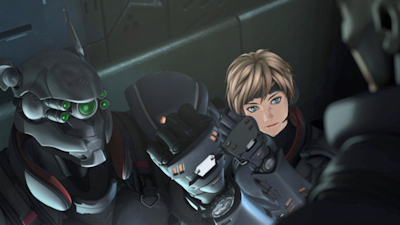
The watches are a nice little touch. At one point Briareos saves Deunan's life, and she kisses her watch as an intimate thank you by proxy since she can't pause the gunfight to actually kiss him.
Review by Jay Wilson “Man seems to yearn for his own destruction.” “It seems so. Yet somehow his spirit always pulls him back from the brink. Perhaps they are a race worth saving.” —Nike & Athena (English version) Appleseed: Ex Machina is impossible, insane, absolutely ridiculous, and I frickin’ love it. It opens with an unapologetic love letter to famed action director, John Woo, who served as producer on this sequel to the 2004 Appleseed, directed once again by Shinji Aramaki based on the Shirow Masamune manga. And all three personalities shine through into a hybrid that takes the best of each creative force with none of their usual shortcomings, yielding something exhilarating, touching, provocative, and magical. Central to Appleseed’s success is the strong protagonists, Deunan and Briareos, two members of the futuristic military, ESWAT. Not only does the opening cathedral raid start Ex Machina off with a bang, but it simultaneously shows the bond between these two. Aeacus, one of their colleagues harasses Briareos, a high-tech Hecatoncheires-class cyborg, about his analog watch and how its ticking is going to get him killed; Aeacus turns to Deunan for support, and she holds up her own analog watch, identical to Briareos’. Later on during the raid, after Deunan has infiltrated into the heart of the bad guy’s heavily fortified lair, she looks up and spots a dozen cyborgs waiting in the rafters. They jump down for the kill, and she smiles. She knows Briareos has her back. And right on cue, he comes crashing through a stained glass window, duel automatics blazing, raining bullets and their casings to the stone floor below. The two stand back to back and take on the remaining legion, perfectly in sync with one another with Deunan jumping and ducking under her partner’s gunfire for no other reason than it looks badass. And at this point, you’re either on board for the roller coaster, or you’re at the beginning of 110 minute bitch fest because it clearly does not give a damn about petty things like realism and logic. 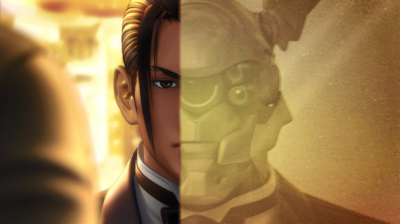
Such a wonderful reveal: Briareos' reflection is seen in a glass door, and as it slides opens his cyborg face is gradually replaced with Tereus who bares his human appearance.
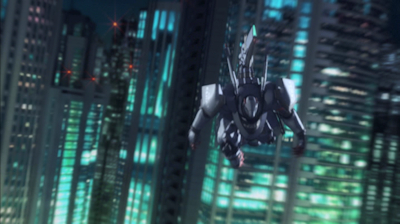
Landmates, heavily armored suits that fly, are a staple to the Appleseed universe and get their due screen time in some breathtaking air battles.

Athena (left) comes across as a lot more powerful and important in this version mainly because her Chief of Staff, Nike, (right) is so prominently featured that Athena, herself, never actually interacts with the protagonists at all.
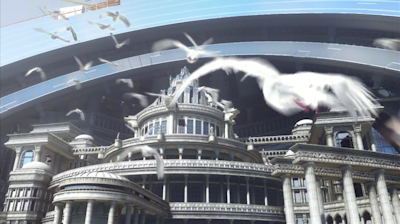
A nice bit of continuity: you can actually see damage (upper left corner) on Tartaros, the capital of Olympus, from the 2004 Appleseed's climax.
But that’s not to say Appleseed: Ex Machina is pure wall to wall spectacle. It knows when to pause for exposition. It knows when to allow the characters their development. It even knows how to use a flashback—quick, to the point, and sparingly. You see, it’s not that I have a problem with flashbacks in and of themselves, rather, it’s that writers frequently use them at the expense of a more important component: pacing. Ex Machina does not bring its greater story to a halt just to deliver useless trivia. It builds upon our duo’s relationship—the very key holding this movie together—during a natural pause between conflicts. It uses a single isolated episode to imply that much more happened between them. And then it immediately jumps back to the present because it has a lot more material to deliver and only one feature length film to cram it all in. And because it is so beautifully paced and because it so effectively utilizes suggestion, it manages to weave together an entire series worth of ideas into its modest running time. Far in the background, a global threat unfolds with a mad scientist wanting to rid the world of war, pain, and suffering by denying them their free will via a technology intended to link people together and, ironically enough, share ideas. In brief snippets we see Athena, the strong and charismatic leader of Olympus, investigating and taking steps to stop the crisis through diplomacy and global unity. But the human mind has problems processing the scale of a catastrophe long before it reaches city, much less worldwide, proportions. So Ex Machina wisely focuses most of its running time on the personal level by using Briareos as the trigger, infecting him with nanomachines that take over his nervous system when his adrenaline gets pushed to the limit. This brings our protagonists to the front line and point blank as Briareos points his guns at Deunan, a character we don’t want to see die and certainly don’t want to see die like this. One of the challenges any storyteller faces regardless of their medium is balancing their characters capabilities with their vulnerabilities. Power fantasies can have their charm, but for the most part a conflict is enhanced by a sufficient threat capable of dooming the heroes. Even if you know the stars will survive—and any intelligent reader/moviegoer/gamer should have an astronomically high success rate in this regards—it has to seem like the good guys can perish. But at the same time nobody likes a worthless whiner; that’s the first person you want to see die in any narrative. Hell, that’s the person you’re willing to jump into the screen and murder, yourself. Somewhere between unstoppable juggernaut and pampered crybaby is a strong yet susceptible character. A character you hold your breath for when they go up against a Goliath and a character you cheer for when they defy the odds and bring the giant down. And what I love about Appleseed Ex: Machina is that it uses Briareos and Deunan’s strengths against them. “Is it true? Did I really attack Deunan?” Briareous asks their mutual friend, Hitomi. And when she confirms his greatest fear, he explodes in a rage because he knows what he’s capable of—the film has gone to great lengths to show exactly what he’s capable of—and he also knows that Deunan’s dedication to him is so strong that she will take any risks to help him. She’ll stay by his side even if the world comes to an end. The very thing that makes her strong and sympathetic is the very same thing that puts her in danger and makes her vulnerable. And that by extension makes Briareos vulnerable because if Deunan falls by his hand, it will destroy Briareos as well. And by strategically intertwining this with glimpses of Olympus during its darkest hours, the film reminds us that this isn’t just happening to our two heroes. It’s happening to the entire city. Citizens are turning on their friends and family. And through Prime Minister Athena, we discover it’s happening not just to Briareos and Deunan or even just the citizens of Olympus, but across the entire Earth and all of her inhabitants. And now the danger is neither local nor abstract. Now it’s everywhere. It’s very real. And it’s very personal. 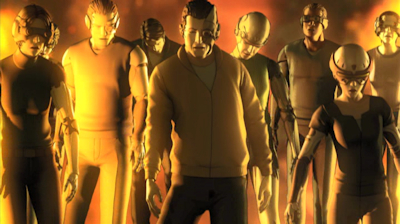
De facto zombies. This movie has everything.
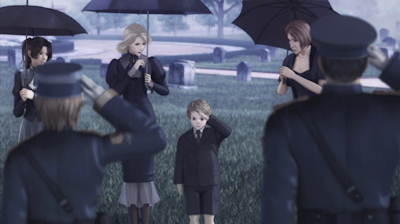
I like how the little boy imitates the ESWAT salute.
It's something a child would do. 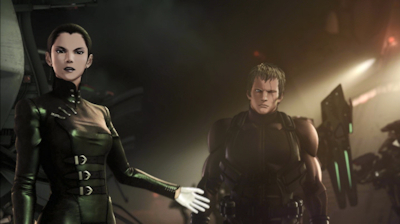
The shady design of Yoshino paints her as a villain, foregoing a surprise reveal in favor of a deal with the devil vibe when she interacts with the protagonists.
But Ex Machina doesn’t stop there. It also introduces Tereus, a bioroid (a genetically engineered human without negative emotions) based on Briareos’ DNA, so he looks and acts like Briareos before he became a cyborg, and this puts the Appleseed main characters into intriguing emotional situations even before the main conflict ramps up. Naturally, Deunan is appalled that they would clone a seemingly exact replica of her friend and lover and even more appalled her bosses want her to partner with him to assess his combat prowess. Though not explicitly articulated, I get the feeling Deunan’s overwhelming negative reaction is because part of her feels something has been lost with the real Briareos and that she might fall for this replica who represents what her partner used to be, betraying the one she fell in love with. And I love how it relies more on subtext than conversation. The closest Deunan comes is the line, “I get confused when I’m with you.” I like the suggestion of inner turmoil because we don’t always talk it out, and by not explaining it away, it makes the relationship deeper, more realistic, and more natural. It leaves room for interpretation and lets you think about it long after watching the movie. Tereus also provides a literal chance for Briareos to battle himself as he battles his demons—what he’s become and what he’s becoming. He, like Deunan, looks at this clone and sees what he’s lost, recognizing that it could mean losing the woman with whom he’s been through hell and back. And it doesn’t help that Aeacus, the cyborg colleague from the beginning, points out that he can’t please Deunan the way he did once upon a time. But what I love is that Ex Machina goes further than just a simple love triangle. With Tereus being a bioroid and Briareos being a cyborg, it provokes the question of what it means to be human and by extension which of these two artificial beings is the more human—a question made more fascinating when you consider neither asked for their current condition. Tereus, created in a laboratory, certainly did not want to be made in another man’s image, and Briareos never volunteered for his cybernetic body. But what really solidifies this intricately woven web of relationships is that Tereus is not some young hotshot asshole trying to replace the original. Being a bioroid, he’s very humble, charismatic, diplomatic, and likeable. He just happens to be trapped in a very emotionally charged, complicated, and uncomfortable situation beyond his control—like Briareos and Deunan—and like both main characters, he’s just trying to find his way through it. And their relationships evolves so dynamically and organically with Briareos at first trying to make the best of it, reassuring Deunan he’s fine with them partnering up although he doesn’t sound convinced, himself, only for Deunan to grow to accept Tereus, sparking a bit of jealously and overprotection in Briareos as his mind, no doubt, starts wandering into what-if territory and imagining where it could lead. And I like that the seeds of their friendship, confidence, and trust in one another start to bloom before the main conflict escalates which makes it more believable that when the situation spirals out of control, they unblinkingly rely on one another, and the world falling apart only solidifies their bond. They know that they need each other, and they know that the conflict around them is bigger than both they and their problems, no matter how monumental those problems may seem. 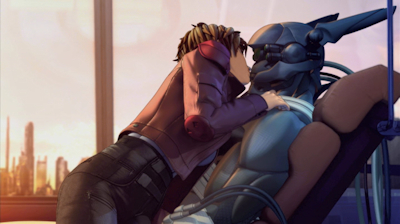
All narratives—action and even horror—require an emotional core.
The only difference between the various genres is the tone of the central conflict and the resolution thereof. Sure, in reality, most people under pressure give in to something very dark and very negative where the littlest things set them off and they resort to primitive tribalism. Deunan, Briareos, and Tereus should break down and argue; they should be at each others’ throats. But these three come together, making them inspiring and larger than life. And it is telling that in a movie that has one of its characters using a motorcycle as a projectile among its many impossible spectacles, Ex Machina only feels the need to address the ridiculousness of a human, a cyborg, and a bioroid teaming up. Did I mention this movie also has a cynical social commentary intertwined with its hopeful message? As Yoshino of the Poseidon Corporation pointedly observes, “Only in Olympus.” | ||||||||||||||||||||
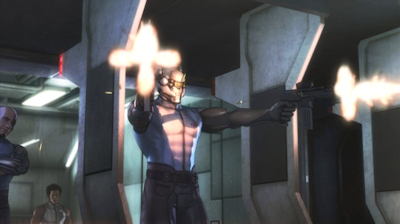
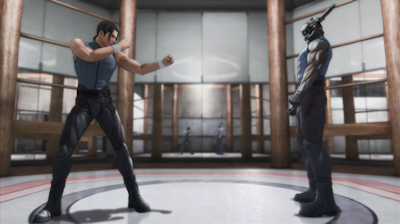
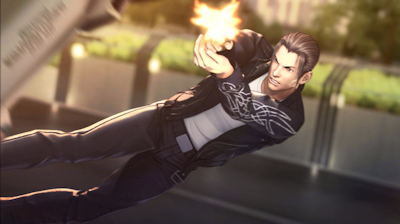
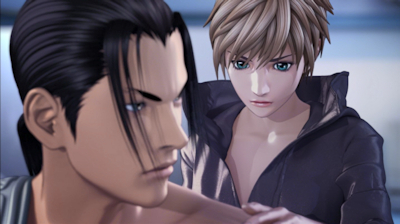
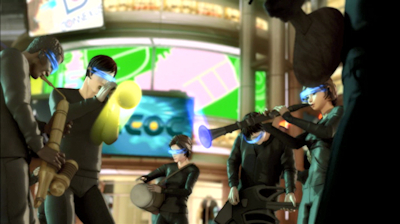 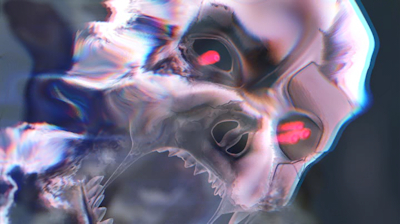
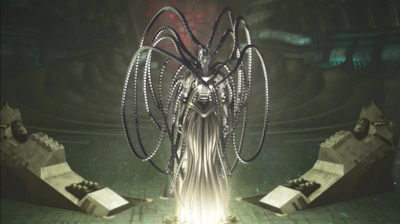
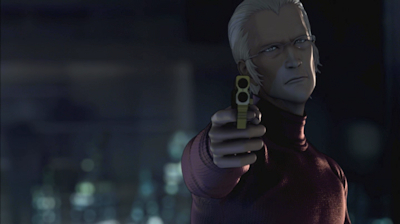
| ||||||||||||||||||||
|
| ||||||||||||||||||||
